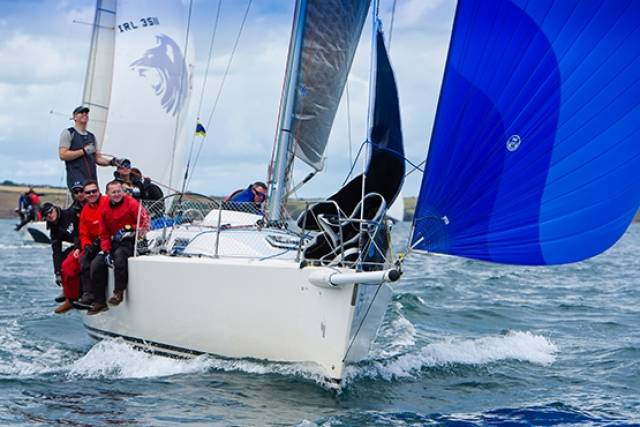Commandant Barry Byrne tells his story of how the Irish military assembled a winning crew in a matter of months for the inaugural international inter-service sailing contest
On 15 January I was called to a special meeting in the Carrigaline Court Hotel. Our then Minister for Defence, Simon Coveney; Defence Forces Chief of Staff, Vice Admiral Mark Mellett; and key personnel from the Royal Cork Yacht Club and Kinsale Yacht Club – headed by Kieran O’Connell, chair of Volvo Cork Week 2016 – had assembled to plan a new event to be called the Beaufort Cup, named in honour of Sir Francis Beaufort, creator of the Beaufort wind force scale.
I would learn at that meeting of the goal to assemble 10 yachts, with military or emergency service crews, to compete in this new multi-race event for Cork Week. However, many present felt that given the relatively short notice – only six months – we would be doing well enough to recruit three boats to constitute a class.
One of the first teams to commit to the event were the Royal Engineers, and I will be forever grateful to them for their support at such a formative stage of the cup’s development. They gave momentum to our cause, as by the time of the event we had 12 top-class teams competing for the newly commissioned Waterford Crystal Beaufort Cup.
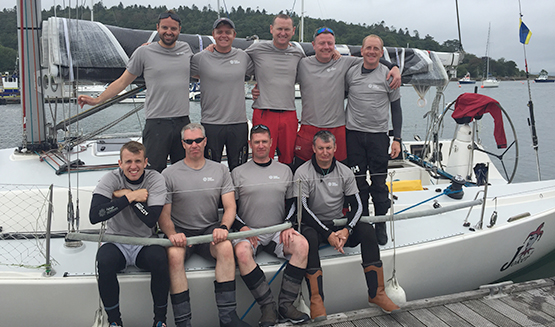
Training challenge
Assembling and training our own Defence Forces team from scratch? That was our first challenge. Many were beginners, plus we had to source the necessary boats. Through the generosity of John Maybury (Joker 2), Tom Roche (Meridian) and Dan Buckley (Justus), we secured three boats to compete in. The Defence Forces contingent increased to four when we were joined by Another Adventure, an A35 skippered for the event by Stefan Hyde. Joker 2, the national champion J109, would be our main effort at winning the cup, and I must thank our fantastic bowman, Flight Sgt Adrian Mulligan, for helping to secure the use of that vessel.
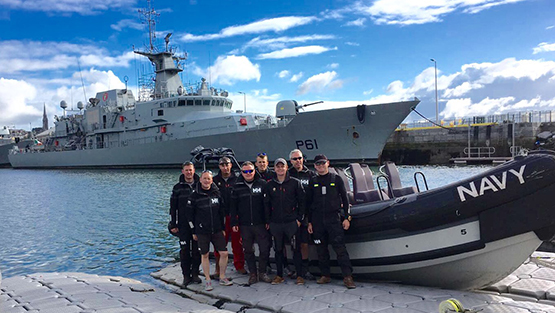
Next came the team trials to select our four competition crews. That meant training in fitness, sailing, sea survival and medical training to ensure all boats and their crews complied with the same Cat 3 regulations as the annual Fastnet Race.
We schooled the beginners on our team in sail and race training with the help of the Irish National Sailing & Powerboat School (INSS), while the Joker crew were put through their paces in manoeuvres with the help of professional coach Maurice ‘Prof’ O’Connell. Simon Johnson kindly assisted in training up our pit and bow team, and my brother Bryan Byrne also came along to share some knowledge.
As the event grew closer, I was to learn that both national and international champions were competing in our class. It was dawning on me that our newly assembled team were going to the home of yacht racing in Ireland, and the oldest yacht club in the world, to try and win a major trophy and €10,000 prize money for a charity of one’s choosing, and the competition would be fierce.
Military principles
We got Joker 2 to Cork early and, her competition pedigree notwithstanding, we spent three full days going through every single element of the boat, stem to stern, keel to windex. We replaced ropes, end-to-ended halyards, scrubbed, dehumidified, welded – you name it, we did it. If I’d quoted ‘Mr America’s Cup’ Dennis Conner’s book No Excuse to Lose to my crew one more time, I think they would have killed me.
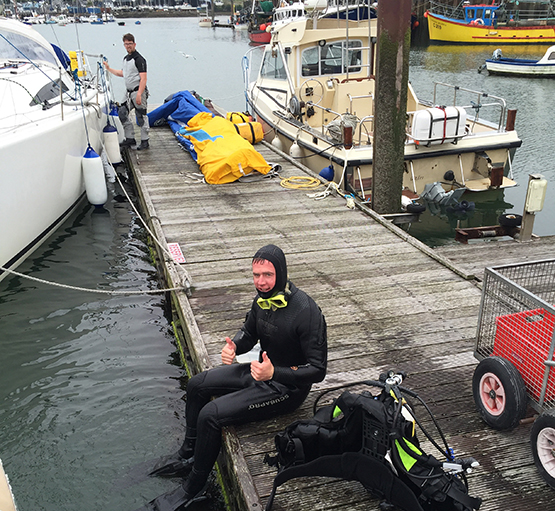
During this time, we also had a hugely important rig settings technical session with Mark Mansfield. This was to prove invaluable for the event. I wanted no ambiguity about what setting we were on for what wind condition, and I would work closely with my sole designated rig adjustor on this. Military principles in practice: one man, one job, own your job. We brought some other military principles to our sailing, too, as we had well-rehearsed standard operating procedures and clear communications, and it stood to us throughout the week.
Fastnet racing
On the morning of the start, Monday 11 July, the popping of SCUBA bubbles hitting the hull from our hardworking crew member Lt Wietse Buwalda as he scrubbed the outside provided the soundtrack as I observed our navigator reviewing the laminated, underlined and highlighted sailing instructions, and I felt like we had done everything we could to prepare for the first day – the daunting 24-hour race around Fastnet Rock.
I have been offshore racing for 20 years and I can honestly say that the short Fastnet run of the Beaufort Cup is one of the most enjoyable I have ever raced. It is the perfect length, and the race down to the famous rock is both stunningly scenic and hugely tactical, with tidal and wind influences to test the very best – not to mention the abundance of wildlife along the way, with whales and dolphins regularly spotted at this time of year. I think the race has the potential to be one of the great lures of Cork Week for international teams in future years.
After ten hours of racing, eight boats in our fleet rounded Fastnet Rock at twilight right beside one another. It was spectacular – or as Prof would say, ‘tremendous’.
Winning that race possibly came down to a single decision by our navigator, Comdt Ian Travers, to gybe out of Glandore Bay when becalmed. We gybed to get better pressure as we had no other options. That said, I do believe two factors came into play here. One, our crew had a hot meal of high-energy army ration packs inside us at one in the morning when we made that manoeuvre, so I feel we were firing on all cylinders as a crew; gybes were good, and kite peels at night went seamlessly. And two, our navigator had run seven weather routing predictions, all but one of which told him to go offshore on the way back from the rock, so he knew what he was doing, even if I didn’t.
We were awarded the impressive Sans Souci Cup at that evening’s black tie gala dinner overlooking the sea from the Naval Service base on Haulbowline. But honourable mention must go to the Royal Engineers, who were unlucky to be becalmed and, in the true spirt of military grit and determination, hung in there to finish the offshore race seven hours behind us, within two minutes of the deadline – and then, with no rest, donned their mess dress uniforms to be the life and soul of the party that night.
The Fastnet race was only the beginning of the Beaufort Cup, of course. The next day saw tighter inshore racing, but we had good starts and produced two firsts and a second, with a solid performance from everyone on the team.
Thursday was the harbour race – and as luck would have it, we dropped our course card over the side six minutes before the start. In the commotion, we ended up dead last on the start. But I have to say, what followed was one of the most tense but also most enjoyable races of my life, as our navigator Capt Mick Liddy – who had replaced Comdt Travers after the offshore – and tactician Peter Bayly picked clear lanes through the fleet and had us in the right air the entire way as we sailed from almost last to first and beat every other J109 in the fleet.
Trust your team
That harbour race, which was to become the last of the event due to fog on the final day, confirmed everything I have always believed about yacht racing: put a team around you that you trust, and then trust them. Let them do their job. I had one policy for that light-winds race, and really it was a policy for the event in general: watch the tell-tales, keep the boat moving fast, and turn the wheel as little as possible. I trusted the team to do everything else.
At the final prizegiving I announced that we would be donating the majority of our winnings to Our Lady’s Children’s Hospital, Crumlin – but in addition, as a mark of respect to the fantastic competition put up by the RNLI crew led by Nicholas O’Leary on True Penance, we would also donate €1,000 to the RNLI. That team performed mightily, with only seconds between us in most races.
Commenting on our victory, Commodore of the Defence Forces Sailing Club, Colonel Peter Richardson, said: “Judging by the success of this inaugural effort, I believe the Beaufort Cup can and will grow to be the top services regatta in the world, attracting hundreds of international competitors, strengthening international and national bonds, and showcasing the fantastic sailing grounds that Cork has to offer.
"Every military in the world recognises the benefits of offshore sailing for leadership and teambuilding; there are no places to hide on a boat in bad weather. As an island nation, we must embrace this resource. Congratulations to the Joker 2 crew on their wonderful achievement.”
I would like to thank the entire Defence Forces team for their efforts in our Beaufort Cup challenge. Thanks also to Kieran O’Connell and the Volvo Cork Week race office for a great event; and our sponsors Axiom Private Clients, Spanish Point Technologies, Helly Hansen and CH Marine. Thank you as well to everyone in the Department of Defence and Defence Forces who helped make this happen.
As I write, services teams from France, Italy, Spain and the US have already committed to challenge for the Beaufort Cup in 2018, and the Irish Defence Forces will be there to defend it.
The crew of the Joker 2 was:
Comdt Barry Byrne
Lt Marcus Ryan
Peter Bayly
Capt Michael Liddy
Brian Phelan
Armn Gary Phelan
Sgt Patrick McGrath
Lt Wietse Buwalda
Flt Sgt Adrian Mulligan
Comdt Ian Travers
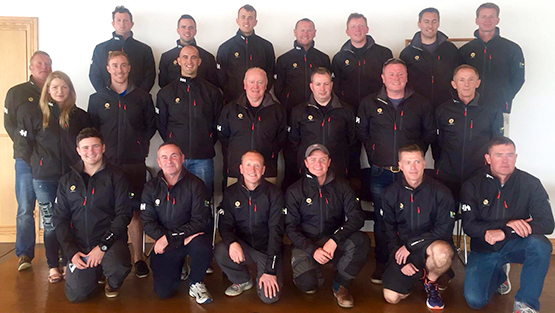 Defence forces Sailing Club: Back row: Comdt Eoin O'Sullivan, Lt Eugene Mohan, Lt Marcus Ryan, Flt Sgt Adrian Mulligan, Pte Stephen Leddy, Lt Cdr Brian Mathews, Comdt Brian Sweeney Middle Row: Cpl John Ferns, Capt Catherine Lundon, Capt Oisin Branagan, Comdt Shane Keogh, Col Peter Richardson, Comdt Mark Donnelly, Sgt Patrick McGrath, Lt Col Oisin Cahill. Front Row: Capt Tom Quigley, Sgt Dave Sliney, Armn Gary Phelan, Comdt Barry Byrne, CS John O'Rielly, Lt Wietse Buwalda.
Defence forces Sailing Club: Back row: Comdt Eoin O'Sullivan, Lt Eugene Mohan, Lt Marcus Ryan, Flt Sgt Adrian Mulligan, Pte Stephen Leddy, Lt Cdr Brian Mathews, Comdt Brian Sweeney Middle Row: Cpl John Ferns, Capt Catherine Lundon, Capt Oisin Branagan, Comdt Shane Keogh, Col Peter Richardson, Comdt Mark Donnelly, Sgt Patrick McGrath, Lt Col Oisin Cahill. Front Row: Capt Tom Quigley, Sgt Dave Sliney, Armn Gary Phelan, Comdt Barry Byrne, CS John O'Rielly, Lt Wietse Buwalda.



























